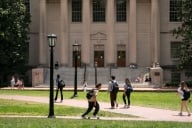You have /5 articles left.
Sign up for a free account or log in.
Yale University will voluntarily pay $135 million to the city of New Haven, Conn., over the next six years, per an agreement the university announced Wednesday.
Private, nonprofit institutions like Yale are in many ways tax-exempt, and their host cities receive little revenue from the institutions compared with typical for-profit businesses. The voluntary payments help make up the difference in lost tax revenue.
“For years people have been calling on Yale to deepen its commitment to our city,” New Haven mayor Justin Elicker said in a press release. “With today’s announcement Yale takes a meaningful step in this direction. I’d like to personally thank [Yale president] Peter Salovey for his partnership and leadership, and I look forward to working with the entire university community to put this agreement into practice.”
The new agreement raises Yale’s contributions to New Haven by $52 million over the six-year period—the largest contribution of any American university to its host city. It will raise its current annual payment from $13 million to $23 million for the next five years and to $17 million in the sixth year.
The university will also make voluntary payments to the city for any New Haven properties that Yale converts into tax-exempt properties. To do so, Yale will pay the full amount of the taxes it would owe for three years, and then diminishing percentages of that total for the following nine years.
In addition, Yale will put $5 million toward establishing a Center for Inclusive Growth that will “develop and implement strategies to grow the city economically,” according to the press release. The university will also provide design plans and funds to the city to convert a stretch of street into a city-owned walkway.
“Yale and New Haven have a bond that has been tested by time and strengthened by shared purpose,” Salovey said in the press release. “As a New Haven anchor institution and the city’s largest employer, the university is proud to do its part in building a community that creates sustained inclusive growth across every neighborhood in the city.”








